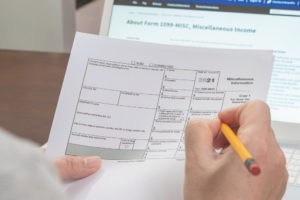
Who even thinks about IRS 1099 forms this early in the year? Like, don’t we have until the end of January to send our form 1099s?
In an ideal scenario, everybody associated with your company fills out & files their tax forms responsibly, and nobody experiences any crazy tax issues… but believe me, things can go horribly wrong real quick when you don’t prep ahead.
One common horror story is when a contractor goes MIA around the holidays (or even worse when January comes rolling in). Oh! The scrambling that goes into catching up on tax reports after the holiday season… not fun!
So, you really want to start preparing yourself and your organization much earlier (hint: throughout the year), so that you can catch any issues quickly… Because let’s be real for a second, nobody wants to go through a tax season dumpster fire!
[nervous laugh]Right?
So, what is a 1099 form?
What other types of 1099 forms are out there?
There are actually a lot of other tax forms that fall in the 1099 category, but these are the common ones that most taxpayers use:
-
1099-MISC
This form cover income that falls outside the clause of the other 1099 forms. Money received from prizes and awards are examples of non-employment income. For those of you who fall under the self-employed category, it’s important to remember that you are responsible for paying the taxes you owe even if you don’t get the form from your employer. If the company submits a 1099 form to the IRS, but you don’t receive it for some reason, the IRS will send you a letter (actually, a bill!) saying you owe taxes on the income. Please note that the letter may not arrive in a timely manner.
- 1099-B
The 1099-B is a form that brokers must use when they sell your stock. It includes the sales date, the purchase price of each security sold, and the proceeds from each sale in order to calculate any capital gains or losses you incurred! - 1099-DIV
If you own stock or other securities and receive over $10 in distributions, such as dividends, then this is a must. This includes any type of distribution that was paid on your stocks including capital gain distributions, nontaxable distributes from liquidation sales. - 1099-G
One of the many important forms that you may need to fill out is a 1099-G. This form helps to report information about unemployment compensation, state and local income tax refunds, agricultural payments or taxable grants, etc. - 1099-INT
Financial institutions (e.g. banks, brokerage firms, insurance companies, mortgage companies, credit unions, etc.) must provide this form if they pay the user more than $10 in interest during the year. - 1099-K
The 1099-k form must be filed by companies that made over 200 transactions with an annual gross revenue of greater than $20,000 through third-party payment processors like Google Checkout, PayPal, or Stripe. - 1099-R.
A 1099-R is the form filed when you get a distribution from your retirement plan. This includes IRS, Roth IRA, and 401(k) plans such as an employer-sponsored account which lets you save for retirement with pre-taxed money.
Why do independent contractors need a 1099 form?
An independent contractor counts as someone who is self-employed. That’s because when you enter a contract with an independent contractor to fill a specific role or complete a specific task, they can set their own hours, use their own tools, and even cater to multiple clients or businesses. Since contractors are considered self-employed, you (the business owner) or the (company) do not withhold taxes from their paychecks, because the contractor is solely responsible for paying their own taxes and providing their own benefits.
If a taxpayer hasn’t received the expected 1099 for income earned—even if the business didn’t file the 1099 form—the taxpayer might be able to report it under miscellaneous income. However, it’s best to contact a tax professional to determine the correct way to file for your particular tax situation.
What is the difference between a 1099-MISC form and a W-2 tax form?
1099s and W-2s are tax forms that help report different incomes.
1099-MISC, for instance, is typically used to report payments made to independent contractors (who cover their own employment taxes).
A W-2 form, on the other hand, is used for employees (whose employer withholds payroll taxes from their earnings). Businesses must issue 1099s to any payee (other than a corporation) who receives at least $600 during the year.
Who is exempt from 1099s?
Exemptions are a unique and often confusing part of the 1099 system. This can be frustrating for accountants who spend hours filling out tax documents but give relief to smaller businesses that cannot afford to hire an accountant or fill out paperwork themselves.
Exempt entities from Form 1099 issuance include any individual, organization, company or charity with income below $600 per year; however certain states may have different requirements which will override federal guidelines. It is best to consult a tax expert like a CPA to make sure that your organization is in compliance with tax laws.
Not sure “what’s the difference between a CPA, CFO, CFP?” Then THIS QUIZ is a MUST! In just three minutes, I’ll help you figure out exactly which finance pro you need, no acronyms included!
When is the 1099 tax form deadline for submission?
The deadline is typically January 31st of every year. You can check the official IRS website for more information on when and how to file your tax forms.
What happens if you don’t submit your 1099 IRS tax form?
What’s the worst that can happen if you work on your tax forms at the last minute? Weeeeell… you might inadvertently miss the cutoff and get a tax or an IRS audit notice.
Non-filing of 1099s to contractors is considered a violation of IRS regulations on information returns. Those who fail to comply can be penalized with fines or imprisonment. So, waiting too long to file your 1099s can be a costly mistake. Penalties can range from $50-280 per form, with the maximum penalty reaching up to 1 million dollars in industry fines!
3 Easy tips to get ahead of the tax season and be a rockstar CEO:
- Make a list of every contractor you’ve paid $600 or more this year to date. (Pro tip: QuickBooks Expenses By Vendor Summary report is super helpful!)
- Make sure you have their W9 on file – ask any contractors for the form if you’re missing theirs. (Pro tip: If you use Gusto to pay your contractors, this is all done for you!)
- Keep all W9s in one place (Google Drive, Dropbox, etc) – you will need them in January!
- Bonus: Repeat this process again in early January to capture any new contractors or ones who’ve hit the $600 threshold in the second part of the year.
P.S. Need help with strategizing for next year’s tax season? We are not a CPA firm and do not file personal or business taxes, but we do know of several trusted CPAs and we’d be happy to make an introduction. We do file the Form 990 for nonprofits and know that form like the back of our hands, so feel free to send your questions through our contact form and let’s connect!




















